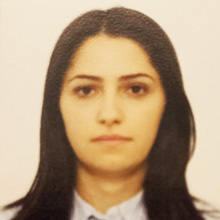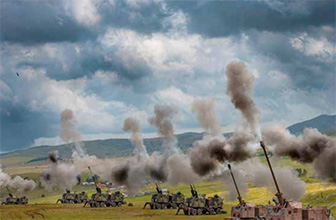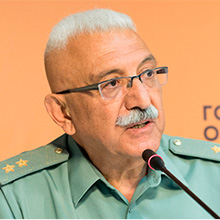
Assessing Armenians’ Geopolitical Situation  By Alan Whitehorn, Professor Emeritus in Political Science, The Royal Military College of Canada
By Alan Whitehorn, Professor Emeritus in Political Science, The Royal Military College of Canada
Armenia is at yet another critical time. The war losses were substantial and impacted greatly. Violent Azerbaijani-Armenian border incidents continue, with property damage, military personnel injuries and deaths. The risks ahead are significant. Accordingly, it is crucial to assess the geopolitical situation that confronts Armenia, commencing first with key problems and challenges and then exploring some opportunities.
Amongst the pressing issues is the fact that demographically Armenia has far less manpower than Azerbaijan, even if women were conscripted too. Armenia’s population has been declining significantly due to outmigration and this pattern has been accelerating after the recent Karabakh war and various phases of the Covid pandemic. An army historically based on conscription needs to address its critical declining population base. READ MORE
- EGF Editor |
Published on EGF: 11.08.2021
| Security
-
Armenia’s Five Stages of Grief  By Benyamin Poghosyan, PhD, Chairman, Center for Political and Economic Strategic Studies
By Benyamin Poghosyan, PhD, Chairman, Center for Political and Economic Strategic Studies
Todd Fabacher, Co-Founder, Distrikt Foundation, Gyumri
Countries, just like people, will experience the five stages of grief after a significant loss. 2020 was a challenging year for all nations. COVID – 19 pandemic and economic downturn have negatively impacted almost everyone. It was an exceptionally difficult year for Armenia because, besides the pandemic, defeat in the war launched by Azerbaijan against the unrecognized Nagorno Karabakh (Artsakh) Republic in autumn 2020 resulted in significant material and human losses. In the first half of 2021, Armenia grasped domestic political instability, triggering an early parliamentary election in June 2021. READ MORE
- EGF Editor |
Published on EGF: 11.08.2021
| Security
-
An Impressive EU Aid Package to Armenia Does not Solve Yerevan’s Dilemma on Karabakh  By Benyamin Poghosyan, PhD, Chairman, Center for Political and Economic Strategic Studies
By Benyamin Poghosyan, PhD, Chairman, Center for Political and Economic Strategic Studies
The EU has thrown Armenia an economic lifeline, but Yerevan has a stark choice ahead: either to use its economic resources to modernise its military and ensure that the Armenian population left in Karabakh is protected, or to create conditions for the Armenians in Karabakh to gradually settle in Armenia.
The EU has always perceived the South Caucasus as a neighbouring area between Europe, the Middle East, and Central Asia. The South Caucasus was never part of the EU's vital interests, but the Europeans were not indifferent to the region's fate. After the collapse of the Soviet Union, the EU signed Partnership and Cooperation Agreements with South Caucasus Republics, and later included the region into the European Neighbourhood policy. The next phase in EU-South Caucasus relations was the launch of the Eastern Partnership initiative and the inclusion of Armenia, Azerbaijan, and Georgia into the program. READ MORE
- EGF Editor |
Published on EGF: 27.07.2021
| External Relations
-
To Open Transport Links in the South Caucasus, Azerbaijan Needs to Avoid the term “Zangezur Corridor”  By Benyamin Poghosyan, PhD, Chairman, Center for Political and Economic Strategic Studies
By Benyamin Poghosyan, PhD, Chairman, Center for Political and Economic Strategic Studies
Armenia always supported the idea of restoring communications and developing economic relations with Azerbaijan as a tangible way of confidence building. However Azerbaijan has to give up its inflammatory and disruptive rhetoric about the "Zangezur Corridor", and its thinly veiled threats to take over the Syunik province from Armenia.
The 10 November 2020 tripartite statement signed by Armenia, Azerbaijan and Russia ended the war in Nagorno Karabakh, but evidently, did not bring peace to the region. A range of complex issues remain to be settled – the future of Nagorno Karabakh, relations between Armenia and Azerbaijan, and the security dynamics of the broader region. Given the Russian military presence in Karabakh, the region's future now mostly depends on the Kremlin, and neither Armenia nor Azerbaijan has much room for manoeuvre here. The status of Karabakh will remain a topic in bilateral Russia–Azerbaijan and Russia–Armenia discussions, but Moscow will do whatever it thinks it is necessary to do. READ MORE
- EGF Editor |
Published on EGF: 19.07.2021
| External Relations
-
Armenian Foreign Policy in the Context of the Transformation of Global Order  By Lilit Galstyan, Senior Research Fellow, Academy of Political Studies, Yerevan
By Lilit Galstyan, Senior Research Fellow, Academy of Political Studies, Yerevan
The end of the Cold War and the collapse of the Soviet Union have ushered in hopes of humanity's happy and harmonious future. The ideas such as "End of history" became very popular both within academic circles and with policymakers. There was a widespread belief that the entire planet would live under liberal democracy, and inter-state conflicts will become bad memories from history. However, the beginning of the XXI century crushed these hopes. Russia - West relations started to deteriorate after the 2004 Orange Revolution in Ukraine, while the 2014 Crimean crisis brought bilateral relations to the lowest point since the end of the Cold War. Meanwhile, the astonishing Chinese economic growth and the emergence of the multi-million middle class did not bring about political changes in China. READ MORE
- EGF Editor |
Published on EGF: 19.07.2021
| External Relations
-
Assessing the Current Situation in the South Caucasus  By Alan Whitehorn, Professor Emeritus in Political Science, The Royal Military College of Canada
By Alan Whitehorn, Professor Emeritus in Political Science, The Royal Military College of Canada
Despite signing the November 9, 2020 ceasefire, Azerbaijan and Armenia have not been able to agree on an actual firm ceasefire. There are too many border incursions and military incidents, despite the existence of decades-old soviet boundaries between republics that were firmly regulated in the former Soviet Union. Peacekeepers are too few and not located in enough areas to address all of the border incidents. READ MORE
- EGF Editor |
Published on EGF: 07.07.2021
| Security
-
Military Aerospace Expertise and Exports from Israel  By Eugene Kogan, Tbilisi-based defence and security expert
By Eugene Kogan, Tbilisi-based defence and security expert
Local domestic military aerospace expertise has been honed over a period of almost 60 years. Israel’s procurement of US-built fighter aircraft and Israeli technicians and aeronautical engineers developing subsystems and avionics for the jets has enhanced their skills and expertise.
Rafael Advanced Defence Systems’ cooperation with Raytheon has taken military aerospace expertise to the next level. The triple combination of buying from the United States, developing subsystems locally, and teaming up with the US has contributed to successful arms exports from Israel. The Ministry of Defence International Defence Cooperation Authority (known as SIBAT) realised in November 2019 that the international arms market was undergoing serious changes and certain adjustments would be needed in order to remain competitive and increase the market share of Israeli defence companies. READ MORE.
- EGF Editor |
Published on EGF: 07.07.2021
| Security
-
Containing China Is No Longer Possible Despite the Fact that Many Want To  By Benyamin Poghosyan, PhD, Chairman, Center for Political and Economic Strategic Studies
By Benyamin Poghosyan, PhD, Chairman, Center for Political and Economic Strategic Studies
China was on everyone's lips at numerous summits and international gatherings in the last days and weeks. "China will be among the key world players throughout the 21st century; it will be the number one economic power, and all have to accept and adapt to this reality. Many are not happy with this prospect and would like to prevent it from becoming a reality, but no one has the necessary capacity to contain China, despite the fact that many want to, for the moment for doing that has passed."
While many states make efforts to eventually overcome the outcomes of the COVID 19 pandemic through a large-scale vaccination process, and seek to return to the pre-2020 life, geopolitics, somehow pushed to the corner by the disease, returns to the spotlight. Recent weeks saw a chain of global summits – G7, NATO, and the USA-Russia meeting. The world leaders discussed many topics – climate change, the restoration of the transatlantic alliance, relations with Russia. However, the most repeated word in all these gatherings was China. “Rise of China”, “China's challenge”, “assertive China”, “China-led world order”, “China hegemony in Asia” – this is perhaps not the complete list of China-related phrases. READ MORE
- EGF Editor |
Published on EGF: 07.07.2021
| External Relations
-
Russia-Turkey Relations after the Karabakh War: A View from Armenia  By Benyamin Poghosyan, PhD, Chairman, Center for Political and Economic Strategic Studies
By Benyamin Poghosyan, PhD, Chairman, Center for Political and Economic Strategic Studies
Russia – Turkey relations are probably among the most discussed topics of Eurasian geopolitics. Experts and pundits are frantically searching for the correct terms to describe them – cooperation/competition, the marriage of convenience, and frenemies – all these words are used in endless efforts to grasp reality beneath the surface of high-level meetings and smiley handshakes of the leaders. The two countries interact in different regions – Middle East, Northern Africa, Black Sea basin, Central Asia, Western Balkans, and South Caucasus. In all these areas, they have overlapping and colliding interests, which have created a complex web of relationships. READ MORE
- EGF Editor |
Published on EGF: 27.06.2021
| External Relations
-
The Architecture of an Innovative Strategic Union Russia-Armenia  Hayk Kotanjian, Lieutenant General (ret), Professor of RA, RF, USA (strategic security studies), Lazarev Club Board Member
Hayk Kotanjian, Lieutenant General (ret), Professor of RA, RF, USA (strategic security studies), Lazarev Club Board Member
The strategic emphasis of the 4th session of the Lazarev Club has been imperatively demanded by the need to find and pursue new ways to prevent the loss of the Armenian national statehood. The end-product of those efforts should be built upon the coincidence of the strategic interests of security and sustainable development of our two fraternal peoples and allied states - Russia and Armenia. The existential importance of brainstorming on the problem of life and death of the state, as well as its innovative development, was exacerbated by the challenge of the upcoming formation of new authorities following the results of the early parliamentary elections. READ MORE
- EGF Editor |
Published on EGF: 27.06.2021
| External Relations
-
